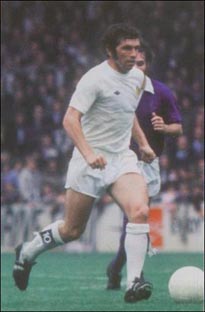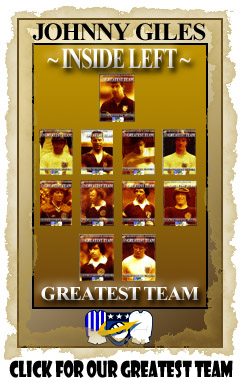

Giles: Michael John (Johnny)
1963-1975
(Player Details)
Midfield
Born: Cabra, Dublin: 06-01-1940
Debut v Bury (h): 31-08-1963
5’7” 10st (1973)
#7 in 100 Greatest LUFC Players Ever

Inside Left in Greatest LUFC Team

Giles’ early career spanned Brunswick Street School, St Columbus FC, Dublin and Republic
of Ireland Schools, Dublin FC, The Leprechuans, Stella Maris and Home Farm. Giles was
spotted in Dublin playing for the famous Nursery Stella Maris Football Club in Drumcondra
and he began his English career with Manchester United, joining them in November 1957. He
was given an early first-team debut in 1958 after eight of the team died in the Munich air
disaster. He was a right winger at Old Trafford and won his first cap at eighteen years
three hundred and sixty-one days, the youngest Eire International at the time. Giles was a
regular first team player over the next four years, playing alongside Bobby Charlton and
Denis Law. Manchester United won the FA Cup in 1963, and it was Giles' defence-splitting
pass which started the move towards the winning goal by David Herd. Shortly after he had
won his F.A. Cup winner’s medal, he asked for a transfer and joined the then Second
Division Leeds United for £33,000 in August 1963. He soon showed his worth, as Leeds won
the Second Division title in his first season. In 1965 he was in the team which came close
to a League Championship and FA Cup "double" but which missed out on both, to Manchester
United and Liverpool respectively. Once Giles took over Bobby Collins’ role of midfield
general, his career took off and Leeds’ glory years began in earnest. Giles formed a
glittering partnership with Billy Bremner as Leeds manager Don Revie built a new team
around them. The players had similarities in their styles and were a tremendous foil for
each other. Giles was known as the creative force and Bremner as the ballwinner, but each
was capable of doing the other's prime job. Despite his craft, Giles was later pinned down
as one of the tougher and dirtier players in what was an often uncompromising Leeds side.
It is said that Giles could place the ball on a sixpence from a distance of fifty yards
with either foot. He was a master of the passing art and he and Billy Bremner crafted a
partnership which became the envy of football. He was the complete midfielder and added to
that the ability to score his fair share of goals, particularly from the penalty spot. In
the 1967–1968 season Leeds won both the League Cup and the Fairs Cup. That was the first
season in which Giles was affected by injury. In 1970 Giles again had a magnificent season
as Leeds chased three trophies but lost all three, the League went to Everton on the last
day; the FA Cup to Chelsea after a replay; and the European Cup campaign ended at the hands
of Celtic in the semi-finals. In the fifth round of the 1971 FA Cup when Leeds were
unexpectedly beaten 3-2 by Colchester United, Giles scored Leeds's second goal as they
almost came back from 3-0 down. Leeds regained the Fairs Cup but lost the League title on
the last day, with Arsenal getting the victory they needed to earn the championship and
form one half of a successful "double" bid. Leeds won their first FA Cup and Giles his
second when they defeated Arsenal 1-0 at Wembley in 1972, yet again they missed out on the
League on the final day of the season after a 2-1 defeat at Wolves. Sunderland and AC Milan
beat Leeds in the finals of the F.A. Cup and the European Cup Winners' Cup in 1973,
rendering Leeds trophyless again. Jack Charlton’s retirement in 1973 also left Giles as the
most senior (in age) member of the squad. In the same year he started to combine his Leeds
duties with a spell as player-manager of his country. In 1974, a twenty-nine-match unbeaten
run at the start of the season helped Leeds coast to their second title, but then
controversy reigned around Giles after Revie quit to take over the England team. Revie
recommended to the Leeds board of Directors that Giles, nearly thirty-four and approaching
the end of his playing career, should be his successor. The board instead appointed Brian
Clough, a brilliant manager but a controversial choice as he had been publicly critical of
Leeds in the past and was not an admirer of Revie. Clough and the players never got on, the
players had wanted Giles too, and the board realised their error, dismissing Clough with a
big pay-off after just forty-four days in charge. Giles still didn't get the job though
(that went to Jimmy Armfield) and concentrated on playing as Leeds chased a place in their
first European Cup final. Giles was outstanding in Leeds' European campaign but was no
longer an automatic fixture in the side. After appearing in the 1975 final, which Leeds
lost 2-0 to Bayern Munich, Giles accepted an offer from West Bromwich Albion, to become
their player manager, while still playing for and managing the Irish team. He left Leeds
for £48,000 after twelve years, five hundred and twenty-one appearances and one hundred and
fourteen goals, a quantity of which came from the penalty spot. Under Giles's leadership
Albion were promoted from the Second Division in April 1976, coming seventh in the First
Division in1976-77. Giles brought Laurie Cunningham and Cyrille Regis into the first team
at a time when black players were only beginning to appear in the English League. He
resigned as manager at West Brom on 21st April 1977, the same day as his former team-mate
Jack Charlton resigned his managerial post as Middlesbrough, and moved back to Ireland to
manage Shamrock Rovers until 1982, winning an F.A of Ireland Cup winners’ medal in 1978. A
stint with Philadelphia Fury, where he made twenty-one appearances, in the NASL followed
and he was a highly successful coach with Vancouver Whitecaps. He returned to the Hawthorns
for a second spell as manager during the 1983-84 season, from February 1984 to October 1985,
steering the side to safety. The following season West Brom started well and were as high
as fifth at Christmas, but twelfth place eventuated. Following a terrible start to the
1985-86 season he left the job, leaving the reins to Nobby Stiles. Giles also proved to be
a successful businessman and then went into journalism. Penning a column for the Daily
Express and working for Irish Television. He is Nobby Stiles’ brother-in-law and hence
John Stiles is his nephew. Altogether his International career lasted nineteen years
partially covering a spell when he managed the Irish team from 1973 to 1980. He gained
sixty full caps for the Republic of Ireland. As player manager of the Republic of Ireland
for much of the 1970s, Giles oversaw a revival in the fortunes of the national side which
had struggled for the previous decade. The 1976 European Championship qualifiers saw the
international debut of Liam Brady and a more respectable showing. In the 1978 World Cup
qualifiers, the side finished only two points short of qualification, though defeating
France at home. His two sons Michael and Chris also played for Shamrock Rovers - Michael
from 1981 to 1983 and Chris from 1993 to 1995. His father Dicky played for Bohemians in the
1920s.